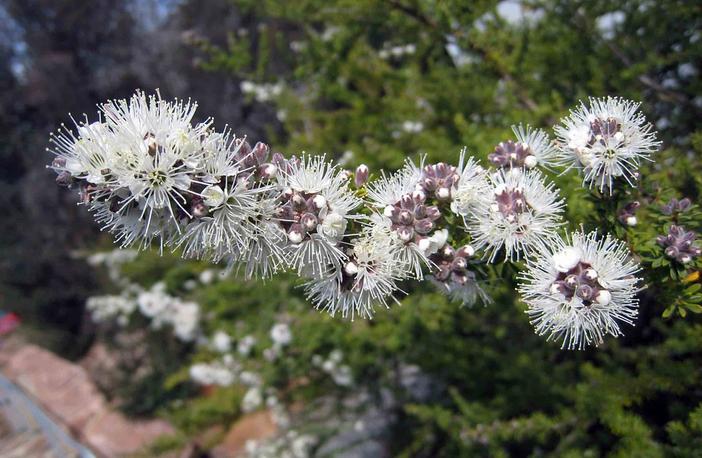Tickbush
(Kunzea ambigua)
Tickbush (Kunzea ambigua)
/
/

阿橋花譜 HQ Flower Guide
CC BY-SA 2.0
Image By:
阿橋花譜 HQ Flower Guide
Recorded By:
Copyright:
CC BY-SA 2.0
Copyright Notice:
Photo by: 阿橋花譜 HQ Flower Guide | License Type: CC BY-SA 2.0 | License URL: https://creativecommons.org/licenses/by-sa/2.0/ | Uploader: 阿橋 KHQ | Publisher: Flickr











































































Estimated Native Range
Summary
Kunzea ambigua, commonly known as Tickbush or White Kunzea, is an evergreen shrub native to coastal heathland and dry sclerophyll forests in Southeastern Australia and Tasmania. It can grow up to 5 meters (16 feet) in height and width, presenting a rounded and bushy habit. The bark is fibrous and furrowed, and the narrow lanceolate leaves are 0.5–1.3 cm in length and 0.2 cm wide, with hairy new growth. From late winter to summer (September to December or January), it produces clusters of small, white, sweetly fragrant flowers that are approximately 1.2 cm in diameter. These flowers are highly attractive to pollinators and beneficial insects.
Tickbush is valued for its hardiness, adaptability, and the ornamental quality of its profuse white blooms. It is commonly used in windbreaks, sand dune stabilization, and natural landscaping, particularly in Australian native gardens. It provides habitat and shelter for small birds and the long-nosed bandicoot. In cultivation, Tickbush thrives in full sun, requires moderate watering, and prefers soils with good drainage. While it is a robust plant, it can be susceptible to root rot in poorly drained soils. It is also used in traditional medicine by indigenous Australians and is known for its essential oil, which has antimicrobial properties.CC BY-SA 4.0
Tickbush is valued for its hardiness, adaptability, and the ornamental quality of its profuse white blooms. It is commonly used in windbreaks, sand dune stabilization, and natural landscaping, particularly in Australian native gardens. It provides habitat and shelter for small birds and the long-nosed bandicoot. In cultivation, Tickbush thrives in full sun, requires moderate watering, and prefers soils with good drainage. While it is a robust plant, it can be susceptible to root rot in poorly drained soils. It is also used in traditional medicine by indigenous Australians and is known for its essential oil, which has antimicrobial properties.CC BY-SA 4.0
Plant Description
- Plant Type: Shrub
- Height: 10-15 feet
- Width: 3-7 feet
- Growth Rate: Moderate
- Flower Color: White
- Flowering Season: Spring
- Leaf Retention: Evergreen
Growth Requirements
- Sun: Full Sun
- Water: Medium
- Drainage: Fast
Common Uses
Bee Garden, Bird Garden, Butterfly Garden, Drought Tolerant, Fragrant, Hedges, Hummingbird Garden, Low Maintenance, Showy Flowers, Street Planting
Natural Habitat
native to coastal heathland and dry sclerophyll forests in Southeastern Australia and Tasmania
Other Names
Common Names: White Kunzea, Poverty Bush
Scientific Names: , Kunzea ambigua, Kunzea corifolia, Leptospermum ambiguum, Metrosideros corifolia, Kunzea pelagia, Metrosideros abietina, Stenospermum corifolium,
GBIF Accepted Name: Kunzea ambigua (Sm.) Druce